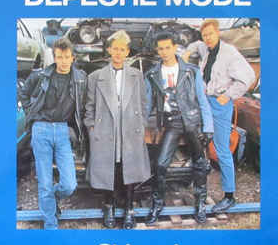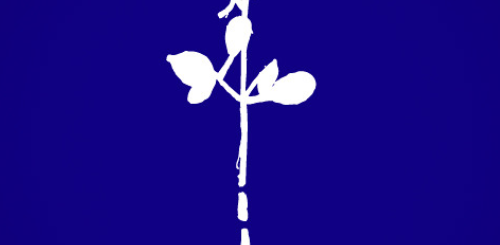Blue Dress by Depeche Mode Lyrics Meaning – Decoding the Subtleties of Desire and Contentment
Lyrics
And don’t say a word
Put it on
The one that I prefer
Put it on
And stand before my eyes
Put it on
Please don’t question why
Can you believe
Something so simple
Something so trivial
Makes me a happy man
Can’t you understand
Say you believe
Just how easy
It is to please me
Because when you learn
You’ll know what makes the world turn
Put it on
I can feel so much
Put it on
I don’t need to touch
Put it on
Here before my eyes
Put it on
Because you realise
And you believe
Something so worthless
Serves a purpose
It makes me a happy man
Can’t you understand
Say you believe
Just how easy
It is to please me
Because when you learn
You’ll know what makes the world turn
Depeche Mode has always been a band that seamlessly blends the provocative with the profound, habitually cloaking significant themes in the folds of synth-pop rhythms and haunting melodies. ‘Blue Dress’ from their iconic album ‘Violator’ is a profound exemplar of this alchemy. At first blush, it might seem to be about the superficial—the mere act of donning an article of clothing—but peel back the synth layers and you find a provocative exploration of desire, objectification, and the elemental aspects of human contentment.
Not unlike the classical poets, Depeche Mode’s lead songwriter Martin Gore uses a seemingly mundane act to delve into the complexities of human relationships and inner psyches with ‘Blue Dress.’ Let’s don the critic’s lens and fathom the depths of a song that transpires as a simple request yet twirls with profound implications beneath its simple surface.
A Plea for Simplicity or a Desire for Control?
The repetitive plea, ‘Put it on,’ serves as a mantra throughout the song, inviting multiple interpretations. On one hand, it showcases the human yearning for simplicity, where contentment derives from straightforward, unremarkable actions. It’s a whisper against the backdrop of chaotic lives, yearning for the time when happiness required no complexity—the simplicity of a blue dress being enough to evoke joy.
Conversely, the specificity of the request—the one that ‘I prefer’—opens a subtle dialogue about control and objectification. Does the blue dress symbolize a power play, a command performance orchestrated for the observer’s pleasure? In a typical Depeche Mode fashion, the lyrics coax the listener to ponder the intricate dynamics of power within relationships, and whether simple acts are as innocent as they appear.
The Hold of the Gaze – Objectification or Admiration?
The lyric, ‘And stand before my eyes,’ teases out a focal aspect of the song—the act of looking. What might initially appear to be an innocuous act of admiration is tinged with a hint of objectification. The dress, and by extension the person in it, is frozen in the sight of the beholder, becoming little more than a tableau vivant for their visual and psychological gratification.
Yet, isn’t there an inherent vulnerability in the beholder, too? Depeche Mode hints at a sort of dependency in the pleasure derived from viewing, or perhaps a genuine reverence—a statement on the transformative power of witnessing beauty, however defined.
The Enigma of Contentment in ‘Blue Dress’
Gore’s lyrics often play on dualities, and ‘Blue Dress’ revels in this tradition. The lines ‘Something so simple / Something so trivial / Makes me a happy man’ juggle innocence and profundity, as the song elevates mundane contentment to art form. There’s poetry in the notion that something deemed inconsequential by societal standards can hold such personal magnitude.
It is a reminder, perhaps, that true joy can eschew materialism and convention. Or is it? In exploring what makes the ‘world turn,’ Gore is reflecting on the broader emotional or existential gratifications that uphold our complex psychological cosmos.
The Unspoken Dialogue within ‘Blue Dress’
The insistent directive ‘Put it on’ never receives a verbal reply, creating a one-sided conversation that speaks volumes. Is the directive a request, or is it meant to evoke a response, to incite action, to challenge the nature of acquiescence? The silence of the other party in this dialogue is deafening, an open space filled by the listener’s interpretation.
This silence also allows for a consideration of consent and agency. What agency does the wearer of the dress possess when left voiceless? Does compliance indicate agreement or submission? The song deliberately omits these answers, leaving the interplay between empowerment and subservience ambiguous.
Ingraining the Memorable: ‘You’ll know what makes the world turn’
The recurrent motif of learning and knowing elaborates an underlying theme of enlightenment in the song. This poignant assertion alludes to a cyclical journey of understanding—one’s own desires and perhaps the nature of desire itself. The song implores the listener to question what truly ‘makes the world turn’ for them.
Moreover, does the world turn on simple, yet heartfelt joys, or the complexities of power dynamics within our interpersonal relationships? Depeche Mode’s deep dive into desire, simplicity, and control spins a philosophical yarn too compelling to be unraveled in one listen, making ‘Blue Dress’ an enduring enigma in their discography earmarked by its memorable lines.








